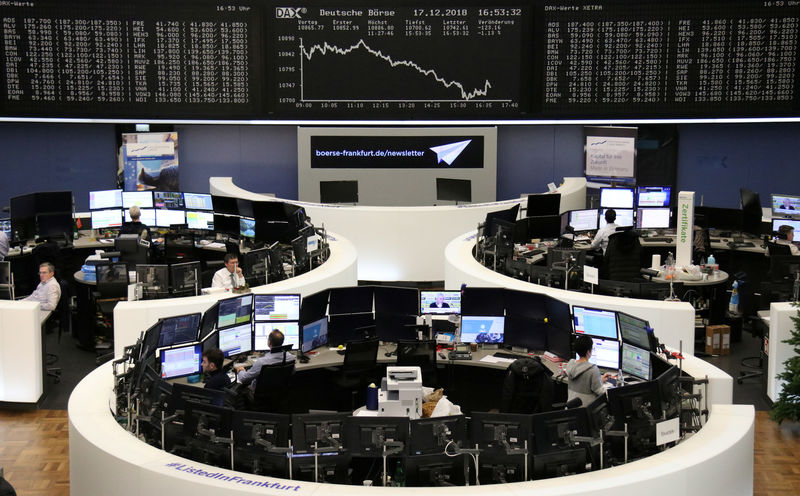By Karin Strohecker
LONDON (Reuters) - European fund managers cut equity exposure to a six-month low and upped cash holdings at the end of a tumultuous year for financial markets, which have been increasingly rocked by concerns over the health of the global economy.
Global stocks (MIWD00000PUS) clawed back some of October's hefty losses in November. But there was no Christmas cheer in store, with equities on track for losses of more than 7 percent in December and major indexes from Japan to China and Germany in bear market territory https://graphics.reuters.com/GLOBAL-MARKETS-BEAR/0100818229L/index.html.
A poll of 14 European asset managers, conducted between December 7-19, saw allocations to equity portfolios slip to 43.9 percent from over 45 percent in November. Meanwhile cash holdings - a risk-off indicator - increased to 9 percent from 7.2 percent in November - their highest level since July.
"Back in September, stock market seasonality turned positive, and investors eagerly set sail for an end-of-year rally, encouraged by resilient earnings growth over past quarters," said Peter van der Welle at Robeco.
Yet signs of slowing growth and negative feedback loops from geopolitics quickly deflated the upbeat mood. The Sino-U.S. trade war, Britain's choppy road to leaving the European Union, Italy's standoff with Brussels over its budget, and crises in Argentina and Turkey all sent reverberations through markets in 2018.
"This greater geopolitical risk coincided with increasing negative surprises on the macroeconomic front in major economic regions, and many investor boats have rolled over as a result. Can investors salvage their boats? Perhaps", van der Welle added.
Across equity portfolios, investors held allocations to North American stocks broadly steady at 42.5 percent but cut exposure to Japanese equities by around one percentage point to 7.9 percent.
Meanwhile, allocations to euro zone stocks jumped by just over one percentage point to 29.8 percent - the highest since May - while holdings of emerging Asian equities and Britain also stood at multi-month highs.
Looking ahead to what 2019 may bring for equities, many fund managers expected emerging market stocks to fare well, saying the recent correction had been overdone.
Trade war tensions, rising U.S. interest rates and crises in Turkey and Argentina have hit emerging markets hard this year with MSCI's (MSCIEF) emerging equity index down more than 25 percent from January peaks.
Across global fixed income portfolios, European fund managers slashed holdings of British debt nearly in half to 2.8 percent. Fund managers also trimmed allocations to North America to 28.1 percent and reduced Asia ex-Japan.

The shifts benefited euro zone debt where holdings rose by three percentage points to 53.3 percent, while exposure to Latin American and emerging Europe fixed income also increased.